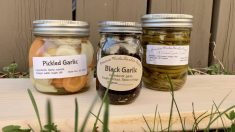The Arctic facility stores and safeguards the world’s crops and plants from global natural or man-made disaster
A giant vault in Norway that holds seeds from around the world is set for a $12.5 million upgrade in order to further protect global food supplies.
The work includes a new concrete-built access tunnel, a service building to house emergency power and refrigerating units, and waterproof walls to prepare for a warmer future.
Built 10 years ago, the Svalbard Global Seed Vault was constructed in an abandoned Arctic coal mine to store and safeguard the world’s crops and plants from global natural or man-made disaster.
Read Also

Farming Smarter receives financial boost from Alberta government for potato research
Farming Smarter near Lethbridge got a boost to its research equipment, thanks to the Alberta government’s increase in funding for research associations.
Should a nuclear war or global warming kill certain crops, governments will be able to request seeds from the vault to restart their agricultural industries.
The vault is home to more than one million unique seed varieties, boosted recently by its latest intake of 70,000 varieties from all over the world.
Seeds include rice, wheat and maize, and unusual crops such as Estonian onion potato and black-eyed pea (cowpea), a major protein source in Africa and Southeast Asia. Malting barley seeds from Ireland have also been deposited.
The vault is located on a remote island in the Svalbard archipelago between Norway and the North Pole and has the capacity to store 4.5 million crop varieties.
Seeds have been withdrawn from the vault only once, in 2015, to create seed banks in Morocco and Lebanon after the region’s central seed bank in Aleppo in Syria was damaged during the country’s civil war. The seeds have since been regrown and were put back in the Norwegian vault in 2017.
Alarms bells were ringing last year when melting permafrost caused by unusually warm temperatures seeped into the seed vault, but fortunately water didn’t flood into the vault itself.
“Agriculture is facing multiple challenges from extreme weather and the demands of a world population expected to reach 10 billion people by 2050,” Norwegian Farm Minister Jon Georg Dale said.
“This means it is more important than ever to ensure that seeds — the foundation of our food supply and the future of our agriculture — are safely conserved.”

















